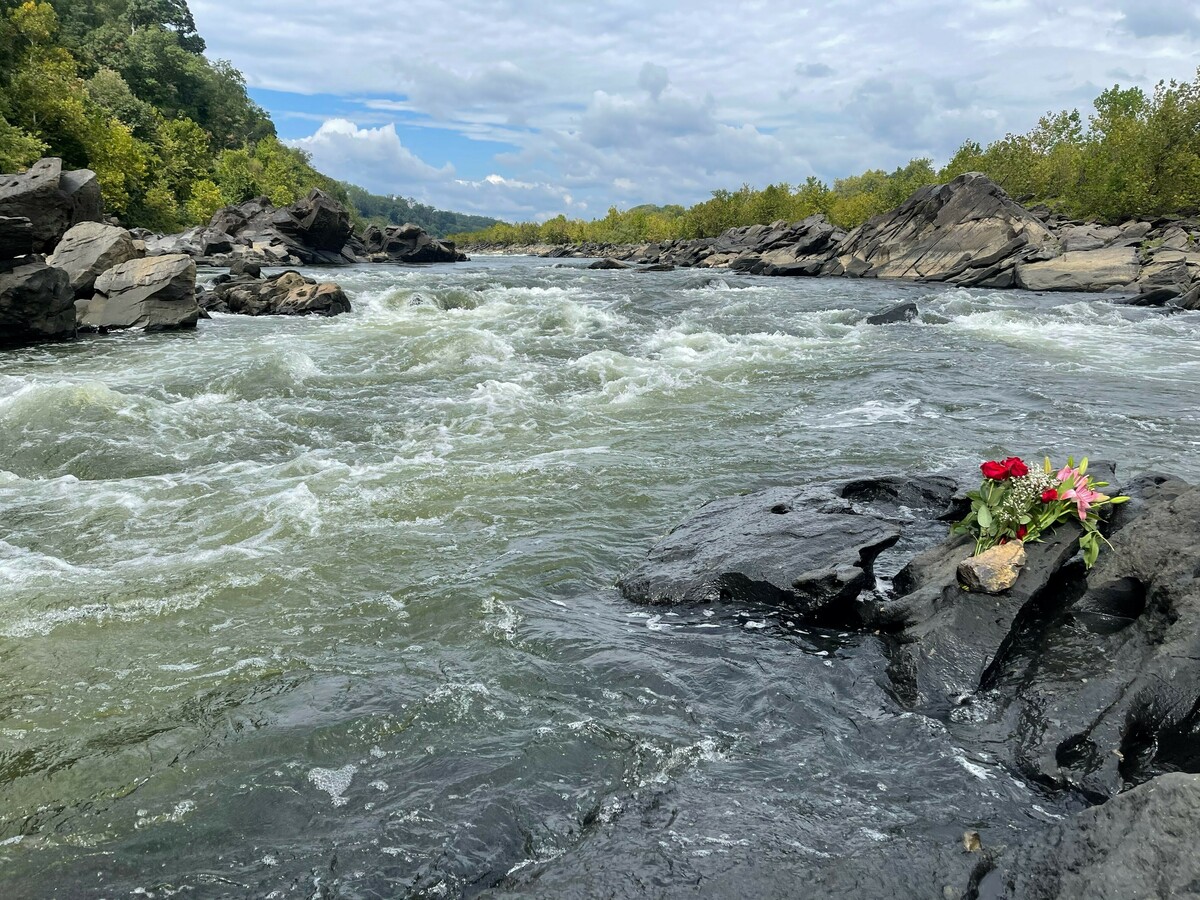
Washington-area whitewater kayakers lay flowers on the Potomac’s Little Falls rapid near the rocks that entrapped visiting kayaker Ella Mills.
Michael Graham
hide caption
toggle caption
Michael Graham

Washington-area whitewater kayakers lay flowers on the Potomac’s Little Falls rapid near the rocks that entrapped visiting kayaker Ella Mills.
Michael Graham
A student at Columbia University has died during a whitewater kayaking trip on the Potomac River along Washington, D.C.
Ella Mills, a junior at Columbia, drowned on Sunday while kayaking with a group of two dozen members of the university’s whitewater kayak club, according to the Montgomery County Fire & Rescue Service. The death is under investigation by the Metropolitan Police Department of D.C.
She and three others in the group capsized while descending down the Little Falls rapid, said local whitewater kayaker Tim Atwell, who frequently runs this section of the river and attempted to help rescue Mills.
“I saw all three of them flip one after the other. And with the speed of the current, they just didn’t see it coming when they flipped,” he said.
Atwell saw the boaters capsize while he was positioned in an eddy above Little Falls rapid, talking to a fisherman friend there — concerned about the group’s level of expertise and unfamiliarity with that section of the river.
The Little Falls rapid is a commonly run section of the Potomac River by many kayakers in the Washington area. According to American Whitewater — the national organization that promotes paddling safety on rivers — Little Falls is is a Class II/III (IV) rapid, meaning that it’s typically suitable for everyone from novices to experts.
“We think of it as fairly safe although not without hazards,” said Washington-area kayak instructor, Ashley McEwan, who has guided many novice boaters down this stretch of the river.
It is an ideal training ground to teach whitewater navigation and swift water recue techniques, McEwan said.
What’s most unusual in this case, including for the local kayakers, is the lower-than-normal water flow these past few weeks due to lack of rain.
Washington-area kayakers who paddle Little Falls nearly everyday have not seen the river this low in decades. The low water flow has surfaced rocks, jammed logs and other unknown hazards even experienced paddlers have never seen.
When Mills flipped and came out of her kayak, her spray skirt — an essential piece of gear used to seal oneself in the kayak — got wedged between rocks that are normally deep under water. She was stuck face-down, according to Atwell.
Atwell said he paddled to her rescue as quickly as he could and summoned the others to help him unsnag her from the rocks and pour over. “We got to her within seconds. But her head was submerged under water,” he said. “It was a futile effort. She was really stuck.”
Atwell and other boaters did what they could while the Montgomery County Potomac swift water rescue squad arrived at the scene. The MOCO Fire & Rescue issued a statement that Mills had “presumably drowned” by the time they got to her.
The president of Columbia University, Minouche Shafik, issued a statement to the university community saying Mills was a third-year student who had moved from Dublin to New York earlier this month to begin her studies at Columbia. Shafik said Mills is survived by her parents, brother and sister.
The Washington-area whitewater community has come together to reflect on the tragic drowning and learn from it. Some local area instructors are looking at revamping their training and knowledge base of the Potomac while the waters remain low.
“When the river is this low, you can see new dangers and add that experience to your toolbox of river knowledge and geology,” McEwan said.
“This is also a time to remember to practice swift water rescue skills and not to get complacent. And practicing your skills for entrapment and for rescue and self-rescue over and over again,” McEwan said.

